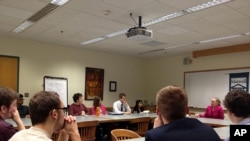“We’ve made the case . . . that there may be difficult times ahead for the world, but the world will be well-served if American leadership remains as essential today as it has in the past,” U.S. Secretary of State Hillary Rodham Clinton said recently to the students at the Maxwell School of Syracuse University in New York. “Because even when leaders and societies criticize the United States, there’s always . . . a thread of concern about where we are and what we will do and whether we can continue to represent the values that we’ve stood for, and serve as an inspiration as well as a . . . strong presence.”
Secretary Clinton indicated that any leadership that the United States conveys has to be rooted in economic and political strength at home. “We could not . . . argue for American positions and American values if people thought that we were not going to remain a strong economy that could support that leadership,” She said.
Because the State Department has to juggle immediate crises and long-term challenges simultaneously, Secretary Clinton has instituted the Quadrennial Diplomacy and Development Review, a planning process that sets goals and objectives for the next four years. “I believe in priorities, and trying to set them and follow them,” Secretary Clinton said. “[We have created] a list of priorities that were both specific, like what we’re going to do in dealing with some of the crisis areas from Iran to North Korea, and more general about the overarching global problem, like global climate change or nuclear proliferation and other weapons of mass destruction.”
In her inaugural speech as Secretary of State, Secretary Clinton quoted Thomas Jefferson, the very first U.S. Secretary of State that “the interests of a nation when well understood will be found to coincide with their moral duties.” Historically Americans have stood for democracy and human rights, “but it’s quite challenging to take what are heartfelt values [of democracy and human rights] . . . and implement them everywhere, every time that we possibly can,” Secretary Clinton said. “[But] we have to constantly [urge for] more openness, more respect for minorities, independent judiciary, protection of the free press, the kinds of pillars of democracy that over [the] years we have learned are essential for the institutionalization of a democratic system.”
Clinton On America And The World

"The world will be well-served if American leadership remains as essential today as it has in the past."



